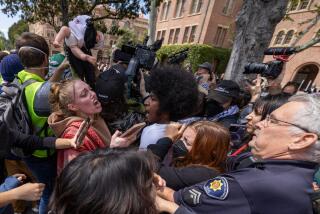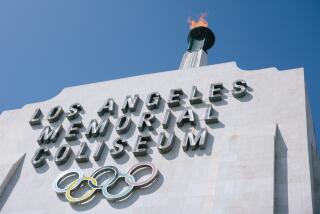Cuba Will Skip the Trip to Seoul
- Share via
Relying on a recent conversation he had with a Cuban government official in Havana, German Rieckehoff, an International Olympic Committee member from Puerto Rico, said early Friday afternoon he was virtually certain Cuba would not boycott the 1988 Olympic Games at Seoul, South Korea, despite its loyalty to ally North Korea.
“The man told me that the person you love more than any other person in life is your mother,” said Rieckehoff, speaking long-distance from his office in Condado, P.R. “When she dies, you cry. You go to her funeral and cry more. You take her to the cemetery and bury her. But you don’t jump into the hole.”
Less than two hours later, Manuel Gonzalez Guerra, president of the Cuban Olympic Committee, proved his close friend Rieckehoff wrong. Appearing at a news conference in Havana, Gonzalez Guerra said he had notified the International Olympic Committee that Cuba will not accept its invitation to the Summer Games.
The Cubans apparently will have little company in the hole they have jumped into with North Korea, which has not made an announcement but has indicated through its official press that it will not attend the Games. Through Friday, 48 hours from the IOC’s Sunday midnight deadline for countries to respond to the invitations, a record 160 of 167 countries had accepted, including all Eastern Bloc countries and China. IOC officials are awaiting word from Albania, Ethiopia, Nicaragua, Syria and the Seychelles.
According to its official press, North Korea will reconsider only if its demands are met to share the Games with Seoul. With Cuban President Fidel Castro acting on occasion as mediator, North Korea has demanded to have eight sports on its side of the border. The IOC has offered five events--table tennis, archery, women’s volleyball, a 100-kilometer cycling race and a preliminary round of the soccer tournament. Gonzalez Guerra said Friday that Cuba would change its position only if North Korea is satisfied.
But although IOC President Juan Antonio Samaranch of Spain has said that negotiations with North Korea might continue beyond Jan. 17, three IOC members contacted Friday by The Times said they do not believe the deadline for accepting invitations to Seoul will be extended for Cuba.
Two of the IOC members, Rieckehoff and Richard Pound of Montreal, said they also believe the Pan American Sports Organization will respond to Cuba’s announcement by withdrawing the 1991 Pan American Games from Havana and awarding them to Mar del Plata, Argentina. PASO’s executive board will meet in March in Uruguay.
After persuading Mar del Plata to retire its candidacy for the 1991 Pan American Games at PASO’s 1986 meeting in Barbados, Rieckehoff recommended that the bid be awarded without dissent to Havana, with the stipulation that Cuba participate in the 1988 Summer Olympics. Of PASO’s 37 countries in North America, South America, Central America and the Caribbean, Cuba was the only one to join the Soviet-led boycott of the Los Angeles Games.
“I don’t have any doubt that PASO would take the games away from Cuba,” Rieckehoff said. “There might be three or four countries that support them but no more.”
Pound, an IOC vice president and a PASO executive board member, said he believes PASO has a moral imperative to withdraw the Pan Am Games from Havana.
“After a while, the sports community has to express a little of its dissatisfaction with countries that boycott,” Pound said. “Why should we reward them by allowing them to have a premier event in their country?”
But Robert Helmick, an IOC member from Des Moines and a PASO vice president, said it is premature to speculate about possible retribution against Cuba.
“I feel very disappointed for the Cuban athletes,” Helmick said. “There is one whole generation of Cuban athletes who will be denied the opportunity to attend an Olympic Games.”
Cuba would probably have been favored to win gold medals in 6 of the 12 boxing divisions and women’s volleyball. It also would have been favored to win in baseball, which will be a demonstration sport in Seoul. In other sports, however, the Cubans are not as strong as they have been in recent years.
Rieckehoff said that might have been one factor in Cuba’s decision not to attend the Games.
“They might also want to show the world that they are fully independent,” Rieckehoff said. “They don’t have to have the Soviets to make their decisions for them.”
At the news conference in Havana, Gonzalez Guerra said the Cubans’ decision was made by Castro, the military, the trade unions and the Cuban Olympic Committee. He said that, besides its solidarity with North Korea, Cuba will not go to Seoul because the political atmosphere in South Korea might result in security problems for athletes. He also said that Cuba’s action is not aimed at the Olympic movement and that he hopes no sanctions will result from it.
“We are making plans to attend the 1992 Olympic Games in Barcelona,” he said.
More to Read
Go beyond the scoreboard
Get the latest on L.A.'s teams in the daily Sports Report newsletter.
You may occasionally receive promotional content from the Los Angeles Times.






